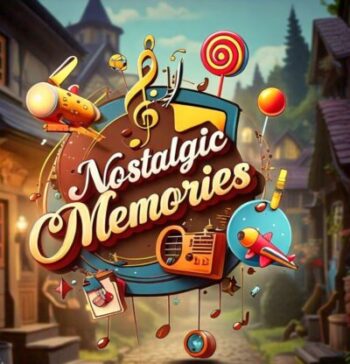Nostalgia is a powerful emotion that transcends time and place. It’s the warm, bittersweet feeling we experience when something reminds us of cherished moments gone by. Whether it’s hearing a childhood song, flipping through old photographs, or even tasting a meal from your youth, nostalgia has a unique way of tugging at our hearts and transporting us back to simpler times. But have you ever wondered why we feel nostalgic and how it influences our lives and choices? This Magic of Nostalgia article will take you on a journey into the science of nostalgia, exploring its psychological and emotional impact, the role it plays in our identities, and the ways it shapes our decisions, behaviors, and relationships. Get ready to take a heartfelt trip down memory lane and uncover the deeper meaning behind this universal emotion.

What is Nostalgia?
Defining the emotion
Nostalgia stems from the Greek words “nostos,” meaning homecoming, and “algos,” meaning pain. Originally, it referred to homesickness—a deep longing to return home, often experienced by soldiers and travelers. Over time, it has evolved into a broader, more complex emotion that blends joy and longing for moments from the past.
This feeling isn’t just about reliving positive experiences; rather, it’s a delicate mix of emotions. Nostalgia often combines warmth, joy, and comfort with a subtle sense of loss or yearning. It’s this emotional duality that makes nostalgia so compelling. While it reminds us of happy times, it also highlights the passage of time and the fleeting nature of those moments.
The Science behind magic of nostalgia
Neurologically, nostalgia is tied to memory recall and the brain’s reward system. When we remember meaningful past experiences, the hippocampus (responsible for memory formation) and the prefrontal cortex (involved in decision-making and emotional regulation) work in sync. This process triggers a release of dopamine—the “feel-good” chemical—making nostalgia a deeply uplifting experience.
Studies show that nostalgia is often initiated by sensory cues. A familiar scent, such as the smell of freshly baked cookies, can bring back memories of a childhood kitchen. A nostalgic song can transport you to a specific moment in time, like dancing at your high school prom. Even the texture of a long-forgotten object, like the pages of an old book, can evoke vivid memories. These sensory triggers serve as windows into the past, allowing us to relive moments long gone.
Interestingly, nostalgia isn’t limited to personal experiences. Collective nostalgia, such as longing for a shared cultural moment or a specific era—like the ’90s—can evoke similar emotions. From old sitcom reruns to vintage fashion trends, the resurgence of these cultural touchpoints is yet another way people connect to their past.
The Emotional impact of nostalgia
Nostalgia promotes happiness
Nostalgia allows us to focus on moments when we felt safe, loved, and content. By calling to mind those joyful times, we can temporarily escape the stresses of the present, uplifting our mood and reducing feelings of anxiety. In fact, research suggests that nostalgic thinking may even increase feelings of optimism and resilience, helping us face current challenges with a more positive outlook.
For instance, think of the comfort of re-watching your favorite childhood movie. The sights, sounds, and emotions tied to that experience can spark a sense of joy and leave you feeling rejuvenated and inspired. Similarly, flipping through an old photo album may remind you of close friendships or accomplishments, providing a much-needed boost to your emotional well-being.
Magic of nostalgia helps define our identity
Nostalgia plays a significant role in shaping our sense of self. When we reflect on poignant memories, they serve as a reminder of who we are, where we came from, and what we value most. These moments link us to our personal history, creating a narrative that defines our identity.
For example, someone who grew up attending large family gatherings might develop a strong sense of valuing togetherness and community as an adult. Similarly, memories of overcoming challenges or accomplishing goals can reinforce a sense of resilience and personal strength. Nostalgia not only connects us to our past but also gives us a better understanding of our present.
Moreover, nostalgia can provide a source of comfort during times of change or uncertainty. Reflecting on past successes and happy moments can remind us of our abilities and the support systems we’ve had in place, giving us the confidence to navigate new challenges.
Boosting social connections
Nostalgia has a way of bringing people together. Sharing old memories with friends, family, or romantic partners not only strengthens bonds but also fosters a sense of belonging. These shared recollections remind us of the love, support, and connections we’ve cultivated over time.
For instance, reminiscing about childhood adventures with siblings or sharing stories from past vacations with friends can reignite feelings of closeness. Even reconnecting with old classmates over memories of school days can create or deepen relationships, as nostalgia often brings people together through shared experiences.
Interestingly, nostalgia isn’t just beneficial for existing bonds; it can also play a role in forming new ones. When we share nostalgic stories with others, it creates common ground, fostering empathy and understanding. This is why nostalgic topics often arise in new relationships, as they help build a sense of intimacy and connection.
Why nostalgia matters
Nostalgia is more than just a trip down memory lane—it’s a tool that helps us navigate life. By connecting us to the past, nostalgia provides stability, identity, and meaning in an ever-changing world. It reminds us of the value of our relationships, reinforces our sense of self, and allows us to find joy even in challenging times. At its core, nostalgia is a testament to the beauty of human experience—the highs and the lows, the love and the loss, and the moments that shape who we are today.
So next time you hear that childhood song or stumble upon an old keepsake, take a moment to embrace the wave of nostalgia it brings. It’s your mind’s way of reminding you of the richness of life, one cherished memory at a time.
How nostalgia shapes our choices
Nostalgia in Consumer Behavior
Marketers have long tapped into the emotional power of nostalgia to influence buying decisions. Retro products or vintage packaging evoke feelings of familiarity, trust, and comfort. Businesses understand that when people are reminded of their happier pasts, they’re more likely to form a connection with a product or a brand. Whether it’s a throwback to childhood treats or classic designs reminiscent of simpler times, nostalgia creates a powerful emotional hook.
Take Coca-Cola’s vintage Christmas ads, for example. These ads don’t just sell soda; they sell the comforting warmth of the holiday season, complete with family gatherings and cherished traditions. Similarly, Nintendo’s re-releases of old consoles like the NES Classic Edition invite players to relive their favorite childhood gaming moments, all while introducing a new generation to the joy of retro gaming. This cyclical effect of nostalgia ensures that brands stay relevant across decades.
The Role of nostalgia in media
Media producers are increasingly turning to nostalgia to captivate audiences on a deeper emotional level. Shows like Stranger Things or movies like Top Gun: Maverick are prime examples of how nostalgia bridges generations. These productions blend cultural elements from the past with modern storytelling to create something that’s both familiar and fresh.
For older audiences, they rekindle fond memories of the past, from the thrill of 1980s blockbusters to iconic cultural symbols like cassette tapes and arcade games. Meanwhile, younger viewers are introduced to these historical references, creating new fans of old classics. It’s no surprise that nostalgic media earns billions in revenue each year, proving that this emotional connection is a lucrative formula.
Beyond financial success, nostalgia in media fosters a sense of community as fans of all ages come together to celebrate timeless stories and shared experiences.
Nostalgia fuels traditions
Nostalgia doesn’t just influence what we buy or watch—it also shapes how we live. It plays a vital role in maintaining personal and cultural traditions. People are often drawn to recreate rituals that evoke warmth and joy, such as celebrating holidays in the same way they did as children or cooking family recipes that have been passed down for generations.
This desire to connect with the past gives traditions a sense of permanence, grounding us in an ever-changing world. For example, many families have specific holiday rituals, like decorating the tree with heirloom ornaments or preparing a beloved dish, that evoke treasured memories of togetherness. Similarly, cultural festivals often draw on collective nostalgia, reminding communities of their shared history and identity.
The benefits and challenges of nostalgia
Positive effects of nostalgia
Nostalgia is more than just a pleasant stroll down memory lane—it’s a powerful emotional tool with real benefits:
- Improves Mood: Thinking about cherished memories can instantly brighten even the hardest days, providing a sense of comfort and positivity.
- Boosts Resilience: Reflecting on times when you overcame challenges in the past can build confidence and encourage you to face current obstacles with strength.
- Strengthens Bonds: Sharing nostalgic stories or experiences with others can lead to meaningful conversations, fostering deeper relationships and connections.
For example, looking through old photo albums with family can spark laughter, storytelling, and a renewed appreciation for loved ones. These shared moments help reinforce bonds and create new memories in the process.
When Nostalgia becomes harmful
While nostalgia is mostly uplifting, it can sometimes become a double-edged sword. Excessive longing for the past may hinder personal growth and prevent people from fully engaging in the present. Romanticizing the “good old days” can lead to dissatisfaction with current circumstances or a reluctance to embrace change.
For instance, someone who constantly reminisces about an idealized childhood may struggle to adapt to adulthood. Overindulging in nostalgia can also make it harder to set goals or plan for the future, as the focus remains on what once was rather than what could be.
If you find yourself dwelling too much on the past, try balancing those memories with present-day practices like journaling or practicing gratitude. Shifting your perspective can help you appreciate the good in your current life while still honoring your past.
How to harness the magic of nostalgia
Create Nostalgic Experiences with Magic of nostalgia
You don’t have to wait for nostalgia to strike—you can intentionally create moments that you’ll cherish later. Start by planning celebrations or activities inspired by your favorite childhood memories. For example, recreate a backyard picnic from your youth, complete with homemade lemonade and classic board games.
Visiting a meaningful location, like a park where you played as a kid or a family vacation spot, can also spark nostalgia while allowing you to create new memories in the same setting.
Use magic of nostalgia for healing
Nostalgia isn’t just fun—it’s also therapeutic. Therapists often recommend reflecting on happy memories as a way to manage grief, anxiety, or other emotional challenges.
Consider compiling a photo album or scrapbook filled with cherished memories. This activity can be particularly comforting after the loss of a loved one, as it allows you to celebrate their life while processing your feelings. Magic of nostalgia can also be a source of strength during difficult times, reminding you of moments when you found joy even in hardship.
Escape Through Nostalgic Media
Revisiting old favorites—whether it’s a beloved book, movie, or song—can provide a much-needed sense of comfort and escape. These small nostalgic trips are often enough to lift your spirits and leave you feeling inspired.
Whether you’re re-watching a classic Disney movie or listening to the playlist that defined your teenage years, these experiences offer a way to pause and reconnect with simpler, happier times.
A Future Rooted in magic of nostalgia
While nostalgia is often associated with the past, its true power lies in how it connects the past, present, and future. Reflecting on what made you happy in the past can guide you in creating new meaningful experiences today. These present moments, in turn, become the cherished memories of tomorrow.
So, don’t underestimate the impact of nostalgia—it’s not just about looking back. It’s a tool for thriving in the present and building a future filled with joy, meaning, and connection. By embracing nostalgia, you can honor your past, enrich your present, and shape a brighter future.




It really feels nostalgic